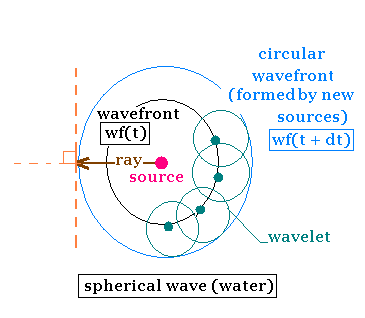Huygens’ Principle:

  The method developed by Huygens (1629-1695) to explain the propagation of light has
no mathematical proof. It is a principle; then accepted as true to be used as a basis
for reasoning. Huygens stated that light emanating from a source moves forward as a wave;
and each point of the wave is considered as a new source from which propagates new waves called
wavelets. All the points equidistant from the source form a locus called wavefront.
Equidistant means same distance, then same time and then same phase.
In the case of
spherical waves (see figure), the lotus of the points is a sphere; within the points are either
all crests, or troughs, or other points between. If the wave is plane, the wavefront is
a plane surface.
Although the method of Huygens uses wave concept, it remains geometrical.
There is a second way to represent a propagating wave, it is a ray, such as a laser beam.
The ray is the projection of the point source to the wavefront.The two ways enter in the
Geometrical (ray) optics division of basic optics.